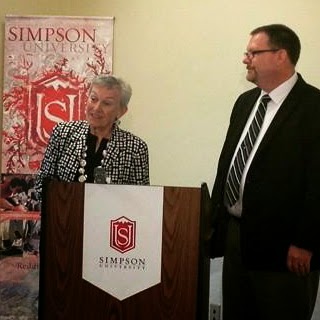To my beloved brothers and sisters, and friends of The Glenburn
Community Church:
 |
| Still a light. |
There is so much that I
would like to say about the past sixteen years since I began serving as the
pastor of The Glenburn Community Church. But many of those blessings are still obscured
by the pain of these past five months. The blessings have not disappeared,
however. The joy and privilege of having served at Glenburn will remain a part
of me forever. And those blessings will again become clearer, I believe, as I
bring my role in prolonging this pain to an end.
Since August 15, I have tried to serve in
as pastorally a fashion as possible, while still adhering to the restrictions
placed on me by our board of trustees. I have (more often than not—but I have
had some dark moments) sought to answer, “What would Jesus have me do?” and
bring as redemptive an outcome as possible for all concerned. In doing so, I
have had two major motivations.
 |
| "Good fences make good neighbors"? Robert Frost didn't think so. |
First, I had hoped to communicate my own repentance,
whether there could be any forgiveness or not. Especially with the addition of
false accusations, I longed to offer clarification as well as confession. But I
remained bound by having been placed on “administrative leave” and instructed
not to initiate contact with any members of the Glenburn congregation. My subsequent
request to address the congregation more formally was denied. And so, I have
complied with this limitation until today. (Let me add here that I have been
very grateful for those who have chosen to initiate contact with Shelly and me.
We have greatly needed and appreciated your support.)
My second motivation is more difficult to describe without
unfairly and unnecessarily disparaging the board of trustees. I cannot imagine
the difficulty they faced in responding to the reports they received. It is perhaps
my own ego that suggests that communicating with me might have helped them to
avoid the missteps that unfortunately complicated the legalities of the
situation. But those entanglements occurred, nonetheless. I take solace in the
hope that the contradictory claims and accusations made were the result of
miscommunication between the board and their lawyer, rather than originating in
intentional misrepresentations of the facts. Still, I have been motivated as
your pastor to hold our board accountable for the unscriptural, unethical, and
illegal actions taken. But those efforts end today.
 |
| Resignation: when the remaining moves merely postpone the inevitable. |
Attempts to have The
Glenburn Community Church legally terminate my employment have been
ineffective. Therefore, I am resigning from my role as your pastor. I do so, not
because I am weary of the horrific process of communicating through multiple lawyers
with my brothers and sisters in Christ. Nor am I motivated by impatience in
wanting to resume communication and perhaps restore our relationships. (That
may be, in fact, impossible.) I would like to believe, however, that I would
persevere in my responsibilities toward you, even if the mental and emotional
stress of responding to conflicting claims and accusations were redoubled. Finally,
I have delayed this decision because, as all of you know, I simply am a pastor to anyone I have opportunity
to serve. Excluding you from my love and care is, indeed, impossible.
I will continue to pray for God’s best blessings to abound
to you and yours. But I remain convinced that doing what is right and good must
first be grounded in what is true. And so, given the complicated structure of
our state’s legal system, I face a scriptural quandary that prevents me from serving
you further. I have condensed the theology of it as best I can in the paragraph
below.
 |
| Stalemate: when there are no further moves possible. |
Romans 13 requires our submission to legal authorities. The
authority governing employment law is the Labor Commissioner. But the focus of
the Labor Commissioner does not differentiate between the board of trustees and
the rest of the church as part of a California not-for-profit religious
corporation. Therefore, the substantial financial penalties would be enforced
against the church, with no recourse to the errors-and-omissions insurance that
would otherwise cover the board’s actions. This is where the quandary arises. In
order to rectify the board’s violations of our bylaws and my contract, without harming
the church financially, it would be necessary to file a lawsuit against the
board. Not all would agree, but I believe that I Corinthians 6 prohibits me
from doing so. (For those familiar with the passage and organizations like
Peacemakers: the board declined the offers of two Christian mediators toward
reconciling these issues.)
As concerned as I am for the future of our congregation,
and for the impact of my own sin and these subsequent events on the testimony
of the body of Christ, I am at an impasse. In seeking what is true, and right,
and good, I entrust you to the care of our Lord and Savior, and whomever else
He may call to serve His purposes at Glenburn in the future. May His grace and
mercy reign.
Still your servant for Jesus’ sake (II Corinthians 4:5),
Bill
Rev. Wm. Darius Myers, DMin, CT








































